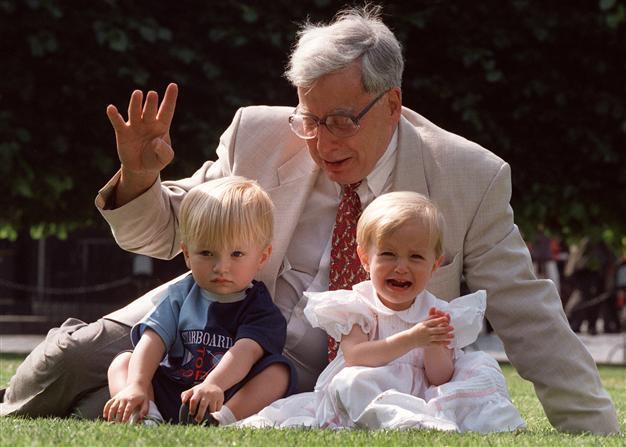Nobel laureate, 'test tube baby' pioneer Robert Edwards dies
LONDON - Reuters

The British pioneer of IVF treatment, Professor Robert Edwards sits with two of his 'test-tube-babies', Sophie and Jack Emery who celebrate their second birthday in London in this file photo dated Monday July 20, 1998. The Nobel prize winner for medicine, Edwards who was a pioneer of in-vitro fertilization, which became known as test tube babies, has died aged 87. AP photo
Robert Edwards, the scientist known as the father of IVF for pioneering the development of "test tube babies" for couples unable to conceive naturally, died on April 10 aged 87.
The Briton, who won the Nobel medicine prize for his achievement in 2010, started developing in-vitro fertilisation (IVF) in 1955 - work that culminated in 1978 in the birth of Louise Brown, the first so-called test tube baby.
More than 5 million babies have been born around the world as a result of the techniques that Edwards, known as "Bob" to his friends, developed with his late colleague Patrick Steptoe.
Edwards, who has five daughters and 11 grandchildren, said he was motivated in his work by a desire to help families.
"Nothing is more special than a child," he was quoted by his clinic as saying when he won his Nobel prize.
IVF is a process by which an egg is fertilised by sperm outside the body in a test tube, giving rise to the term "in vitro" or "in glass".
Working at Cambridge University in eastern England, Edwards first managed to fertilise a human egg in a laboratory in 1968. He then started to collaborate with Steptoe.
In 1980, the two founded Bourn Hall, the world's first IVF clinic, in Cambridge, where gynaecologists and cell biologists from around the world have since come to train.
Vatican tried to 'shut out' research
Experts say that today, as many as 1 to 2 percent of babies in the Western world are conceived through IVF.
Yet Edwards' work and its consequences remain controversial. The Roman Catholic Church strongly opposes IVF as an affront to human dignity that destroys more human life than it creates - because scientists discard or store unused fertilised embryos.
Working together in the 1960s and 1970s, Edwards and Steptoe, a gynaecologist, pursued their research despite opposition from churches, governments and many in the media, as well as scepticism from scientific colleagues.
"A lot of people go around saying they're pioneers, but this man really was," said Dr Mark Sauer, head of Reproductive Endocrinology and Infertility at Columbia University Medical Center in New York.
"What was unique about Bob is that he did this pioneering work at a time when it was immensely unpopular."
In the late 1970s and for years after, much of the public viewed test tube babies as "ghastly and scary", said Sauer.
"The Vatican tried to shut (Edwards and Steptoe) down. They did their work at great personal risk to their careers. But Edwards was a fighter, and he believed in what he was doing. He knew the human side of it" - the couples unable to conceive without medical help.
Edwards and Steptoe struggled to raise funds and had to rely on private donations, but in 1968 they developed methods to fertilise human eggs outside the body.
Early flawsWorking at Cambridge University, they began replacing fertilised embryos into infertile mothers in 1972. But several pregnancies spontaneously aborted due to what they later discovered were flawed hormone treatments.
In 1977, they tried a new procedure, which relied not on hormone treatments but on precise timing. On July 25 of the following year, the world's first IVF baby was born.
According to the European Society of Human Reproduction and Embryology (ESHRE), around one in six couples worldwide experience some form of infertility problem at least once during their reproductive lifetime.
Since Edwards' pioneering work, various forms of "assisted reproductive technology" have been developed, including intracytoplasmic sperm injection (ICSI) - a process by which an egg is fertilised by injecting it with a single sperm.
Dr. Zev Rosenwaks, Director of the Ronald O. Perelman and Claudia Cohen Center for Reproductive Medicine in New York, said Edwards had been "revered" in his field.
"The fact that he did not get the Nobel earlier must have reflected other forces," Rosenwaks said. Many of us wrote letters nominating him many years before he finally achieved it."
